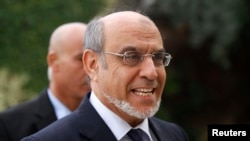TUNIS —
The secretary-general of Tunisia's ruling Islamist party said on Wednesday he favored a non-partisan cabinet in what may be a significant concession to the secular opposition after weeks of anti-government unrest.
Tens of thousands rallied on Tuesday in downtown Tunis in an escalation of protests since the July 25 assassination of opposition figure Mohammad Brahmi, the second such killing this year. Radical Islamists were blamed for both attacks.
“We need to form a non-political government to lead the country to elections within six months,” said Hamadi Jebali, the second-ranking leader in the moderate Islamist Ennahda party.
The opposition is angry about the two assassinations and has been emboldened by the Egyptian military's removal of President Mohamed Morsi last month after mass protests against his perceived attempts to entrench Islamist control of the state.
Jebali's gesture appeared to depart from Ennahda's standing rejection of opposition demands for the dismissal of Prime Minister Ali Larayedh. But the final word rests with party chairman Rached Ghannouchi, who has not commented.
Jebali also called for the Constituent Assembly to complete its drafting of a constitution and electoral law in a few weeks to help defuse Tunisia's worst political crisis since secular autocrat Zine el-Abidine Ali fell to a popular uprising in 2011.
The instability has worsened as jihadi militants step up attacks. Ghannouchi was due on Wednesday to meet Hussein Abassi, the head of Tunisia's powerful UGTT union federation which has good relations with opposition parties, to discuss ways to end the political crisis. It would be the second such meeting this week.
Hamma Hammami, a senior figure in the Salvation Front, which groups more than 10 secular opposition parties, said the opposition would only negotiate with Ennahda after the dissolution of the Islamist-led government.
New constitution
The Salvation Front called in a statement on Wednesday for a campaign to dismiss all Islamist governors appointed by the Ennahda-led government, and said it would continue to mobilize efforts to topple the country's Islamist rulers.
Ghannouchi told Reuters in interview last week that his party was open to dialog with secular opponents but that removing Prime Minister Ali Larayedh was out of the question.
The opposition wants to void the transitional parliament that has been drafting a new constitution and electoral law, fearing that it will cement Islamist domination in a country traditionally one of the most secular in the Arab world.
Secularists aim to announce an alternative “salvation government” next week, suggesting little prospect of compromise.
The head of the transitional parliament, a member of a secular party in the unsteady government coalition, suspended the legislature a week ago in protest at a lack of meaningful talks between Ennahda and the opposition.
Unlike in Egypt, where the army helped protestors oust President Hosni Mubarak in 2011, Tunisia's armed forces do not have a large, lucrative stake in the economy and have not traditionally intervened in politics. Few observers expect Tunisia's military to step in to resolve the current crisis.
Tens of thousands rallied on Tuesday in downtown Tunis in an escalation of protests since the July 25 assassination of opposition figure Mohammad Brahmi, the second such killing this year. Radical Islamists were blamed for both attacks.
“We need to form a non-political government to lead the country to elections within six months,” said Hamadi Jebali, the second-ranking leader in the moderate Islamist Ennahda party.
The opposition is angry about the two assassinations and has been emboldened by the Egyptian military's removal of President Mohamed Morsi last month after mass protests against his perceived attempts to entrench Islamist control of the state.
Jebali's gesture appeared to depart from Ennahda's standing rejection of opposition demands for the dismissal of Prime Minister Ali Larayedh. But the final word rests with party chairman Rached Ghannouchi, who has not commented.
Jebali also called for the Constituent Assembly to complete its drafting of a constitution and electoral law in a few weeks to help defuse Tunisia's worst political crisis since secular autocrat Zine el-Abidine Ali fell to a popular uprising in 2011.
The instability has worsened as jihadi militants step up attacks. Ghannouchi was due on Wednesday to meet Hussein Abassi, the head of Tunisia's powerful UGTT union federation which has good relations with opposition parties, to discuss ways to end the political crisis. It would be the second such meeting this week.
Hamma Hammami, a senior figure in the Salvation Front, which groups more than 10 secular opposition parties, said the opposition would only negotiate with Ennahda after the dissolution of the Islamist-led government.
New constitution
The Salvation Front called in a statement on Wednesday for a campaign to dismiss all Islamist governors appointed by the Ennahda-led government, and said it would continue to mobilize efforts to topple the country's Islamist rulers.
Ghannouchi told Reuters in interview last week that his party was open to dialog with secular opponents but that removing Prime Minister Ali Larayedh was out of the question.
The opposition wants to void the transitional parliament that has been drafting a new constitution and electoral law, fearing that it will cement Islamist domination in a country traditionally one of the most secular in the Arab world.
Secularists aim to announce an alternative “salvation government” next week, suggesting little prospect of compromise.
The head of the transitional parliament, a member of a secular party in the unsteady government coalition, suspended the legislature a week ago in protest at a lack of meaningful talks between Ennahda and the opposition.
Unlike in Egypt, where the army helped protestors oust President Hosni Mubarak in 2011, Tunisia's armed forces do not have a large, lucrative stake in the economy and have not traditionally intervened in politics. Few observers expect Tunisia's military to step in to resolve the current crisis.





